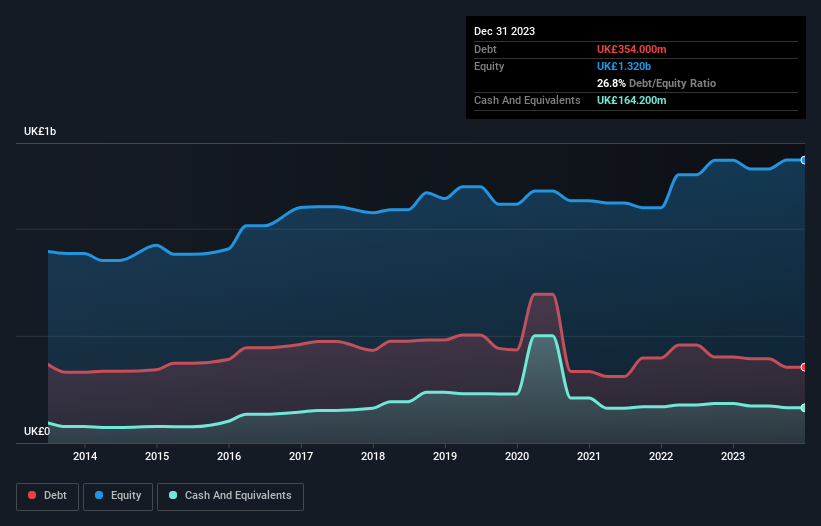Howard Marks put it nicely when he said that, rather than worrying about share price volatility, 'The possibility of permanent loss is the risk I worry about... and every practical investor I know worries about.' So it seems the smart money knows that debt - which is usually involved in bankruptcies - is a very important factor, when you assess how risky a company is. Importantly, Vesuvius plc (LON:VSVS) does carry debt. But the more important question is: how much risk is that debt creating?
Why Does Debt Bring Risk?
Generally speaking, debt only becomes a real problem when a company can't easily pay it off, either by raising capital or with its own cash flow. Ultimately, if the company can't fulfill its legal obligations to repay debt, shareholders could walk away with nothing. However, a more usual (but still expensive) situation is where a company must dilute shareholders at a cheap share price simply to get debt under control. Of course, debt can be an important tool in businesses, particularly capital heavy businesses. When we examine debt levels, we first consider both cash and debt levels, together.
View our latest analysis for Vesuvius
What Is Vesuvius's Debt?
As you can see below, Vesuvius had UK£354.0m of debt at December 2023, down from UK£401.1m a year prior. However, it also had UK£164.2m in cash, and so its net debt is UK£189.8m.

How Healthy Is Vesuvius' Balance Sheet?
Zooming in on the latest balance sheet data, we can see that Vesuvius had liabilities of UK£474.5m due within 12 months and liabilities of UK£487.5m due beyond that. Offsetting this, it had UK£164.2m in cash and UK£446.8m in receivables that were due within 12 months. So its liabilities total UK£351.0m more than the combination of its cash and short-term receivables.
This deficit isn't so bad because Vesuvius is worth UK£1.30b, and thus could probably raise enough capital to shore up its balance sheet, if the need arose. But it's clear that we should definitely closely examine whether it can manage its debt without dilution.
In order to size up a company's debt relative to its earnings, we calculate its net debt divided by its earnings before interest, tax, depreciation, and amortization (EBITDA) and its earnings before interest and tax (EBIT) divided by its interest expense (its interest cover). The advantage of this approach is that we take into account both the absolute quantum of debt (with net debt to EBITDA) and the actual interest expenses associated with that debt (with its interest cover ratio).
Vesuvius's net debt is only 0.79 times its EBITDA. And its EBIT covers its interest expense a whopping 22.9 times over. So we're pretty relaxed about its super-conservative use of debt. But the bad news is that Vesuvius has seen its EBIT plunge 13% in the last twelve months. We think hat kind of performance, if repeated frequently, could well lead to difficulties for the stock. There's no doubt that we learn most about debt from the balance sheet. But it is future earnings, more than anything, that will determine Vesuvius's ability to maintain a healthy balance sheet going forward. So if you're focused on the future you can check out this free report showing analyst profit forecasts.
Finally, while the tax-man may adore accounting profits, lenders only accept cold hard cash. So we clearly need to look at whether that EBIT is leading to corresponding free cash flow. Looking at the most recent three years, Vesuvius recorded free cash flow of 46% of its EBIT, which is weaker than we'd expect. That's not great, when it comes to paying down debt.
Our View
On our analysis Vesuvius's interest cover should signal that it won't have too much trouble with its debt. But the other factors we noted above weren't so encouraging. In particular, EBIT growth rate gives us cold feet. Looking at all this data makes us feel a little cautious about Vesuvius's debt levels. While debt does have its upside in higher potential returns, we think shareholders should definitely consider how debt levels might make the stock more risky. When analysing debt levels, the balance sheet is the obvious place to start. However, not all investment risk resides within the balance sheet - far from it. To that end, you should be aware of the 2 warning signs we've spotted with Vesuvius .
Of course, if you're the type of investor who prefers buying stocks without the burden of debt, then don't hesitate to discover our exclusive list of net cash growth stocks, today.
New: Manage All Your Stock Portfolios in One Place
We've created the ultimate portfolio companion for stock investors, and it's free.
• Connect an unlimited number of Portfolios and see your total in one currency
• Be alerted to new Warning Signs or Risks via email or mobile
• Track the Fair Value of your stocks
Have feedback on this article? Concerned about the content? Get in touch with us directly. Alternatively, email editorial-team (at) simplywallst.com.
This article by Simply Wall St is general in nature. We provide commentary based on historical data and analyst forecasts only using an unbiased methodology and our articles are not intended to be financial advice. It does not constitute a recommendation to buy or sell any stock, and does not take account of your objectives, or your financial situation. We aim to bring you long-term focused analysis driven by fundamental data. Note that our analysis may not factor in the latest price-sensitive company announcements or qualitative material. Simply Wall St has no position in any stocks mentioned.
About LSE:VSVS
Vesuvius
Provides molten metal flow engineering and technology services to steel and foundry casting industries worldwide.
Undervalued with excellent balance sheet and pays a dividend.
Similar Companies
Market Insights
Community Narratives





